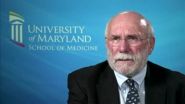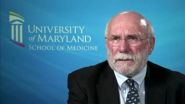Click here for more information.
Professor Myron M. Levine, MD, Director of the Center for Vaccine Development (CVD) at the University of Maryland School of Medicine (UM SOM), and UM SOM Dean E. Albert Reece MD, PhD, MBA, announced today that the CVD, in conjunction with its sister institution, The Center for Vaccine Development of Mali (CVD-Mali) and the Ministry of Health of Mali, have begun a clinical trial in health care workers (and other front-line workers) to evaluate a promising experimental Ebola vaccine. The trial began on Wednesday, October 8 with the vaccination of the first subject, followed by two additional participants today (October 9), all three being Malian health care workers. In the coming weeks 37 more health care workers will receive the vaccine. "This research will give us crucial information about whether the vaccine is safe, well tolerated and capable of stimulating adequate immune responses in the highest priority target population, health care workers in West Africa," said Prof. Levine. "If it works, in the foreseeable future it could help alter the dynamic of this epidemic by interrupting transmission to health care and other exposed front-line workers."
The vaccine consists of an adenovirus (cold virus) that does not cause illness in humans and has been modified so that it cannot even multiply in humans but produces a single attachment protein of Ebola virus. Immune responses directed against this single Ebola protein have been shown to be highly protective in animal model challenge studies (carried out under the highest level of physical containment). Researchers hope this response will be robust enough to protect humans, as well, from the disease. The vaccine was developed by investigators at the Vaccine Research Center (VRC) of the National Institute of Allergy and Infectious Diseases (NIAID) in Bethesda, MD. The clinical trial in Mali brings to fruition two months of work by a consortium dedicated to move the candidate Ebola vaccine (which prior to September had been tested only in animals but not in humans) into clinical studies in West Africa. The consortium, assembled in mid-August at the behest of the World Health Organization (WHO), included, besides WHO, the VRC (which developed the vaccine), the Jenner Institute at the University of Oxford (which carried out clinical trials in UK adults paving the way for the African trial), the CVD-UM SOM and CVD-Mali (carrying out the first clinical trial of the vaccine in West Africa), GlaxoSmithKline (GSK) Biologicals (manufacturer of the vaccine) and the Wellcome Trust, UK (funder of the clinical trials in UK and Mali), with additional funding provided by the Medical Research Council (MRC), UK and the UK Department for International Development (DFID). In addition, the MRC Unit-The Gambia is expected soon to initiate a second, parallel clinical trial in The Gambia, West Africa. Ordinarily it would take between six to 11 months to obtain all necessary ethical, regulatory agency, technical and administrative approvals needed to transition a vaccine from research in animal models to a clinical trial in a developing country where subjects are at risk of the natural disease. In this instance, with all consortium members working in unison, it took two months. "This is just the critical first step in a series of additional clinical trials that will have to be carried out to fully evaluate the promising vaccine," said Professor Samba Sow, Director General of CVD-Mali. "However, if it is eventually shown to work and if this information can be generated fast enough, it could become a public health tool to bring the current, and future, Ebola virus disease epidemics under control." "Malian health care workers are showing keen interest in participating in the clinical trial to help evaluate this vaccine," said Dr. Milagritos Tapia, a key clinical investigator overseeing the trial in Mali.
"Ebola is among the most urgent international public health issues we are facing. This research will play a key role in helping to solve it," said Dean E. Albert Reece, MD, PhD, MBA, as well as vice president of medical affairs, the University of Maryland and the John Z. and Akiko Bowers Distinguished Professor. "Dr. Levine, Dr. Sow and Dr. Tapia have done an extraordinary job, and are working hard to contribute their expertise to the worldwide effort to fight this virus." Pre-clinical research in primates by the VRC and Okairos, a biotechnology company acquired last year by GSK, indicate that the vaccine provides protection in non-human primates exposed to Ebola without significant side effects. The recent increase in funding for Ebola vaccine research is also enabling GSK to begin manufacturing at least 10,000 additional doses of the vaccine, even as the first clinical trials are occurring.
"This is impressive work by multiple groups to get this trial off the ground very quickly," said Dr. Levine. "It is a testament to everyone's commitment to fighting Ebola as aggressively as possible."
INFORMATION:
CVD-UM SOM has earned an international reputation for creating and testing vaccines against cholera, typhoid, non-typhoidal Salmonella, dysentery, malaria, and multiple other infectious diseases, including influenza. In addition to its research and outpatient facilities in Baltimore, the center conducts extensive research in Africa, Asia and Latin America.
About the University of Maryland School of Medicine
The University of Maryland School of Maryland, chartered in 1807 as the first public medical school in the United States, continues today as a leader in accelerating innovation and discovery in medicine. The School of Medicine is the founding school of the University of Maryland, and is an integral part of the 11-campus University System of Maryland. Located on the University of Maryland's Baltimore campus, the School of Medicine works closely with the University of Maryland Medical Center and Medical System to provide a research-intensive, academic and clinically based education. With 43 academic departments, centers and institutes and a faculty of more than 3,000 physicians and research scientists, plus more than $400 million in extramural funding, the School is regarded as one of the leading biomedical research institutions in the U.S.A., with top-tier faculty and programs in vaccine development, cancer, brain science, surgery and transplantation, trauma and emergency medicine, and human genomics, among other centers of excellence. The School is not only concerned with the health of the citizens of Maryland and the U.S.A., but also has a global presence, with research and treatment facilities in more than 30 countries around the world. http://medschool.umaryland.edu/





